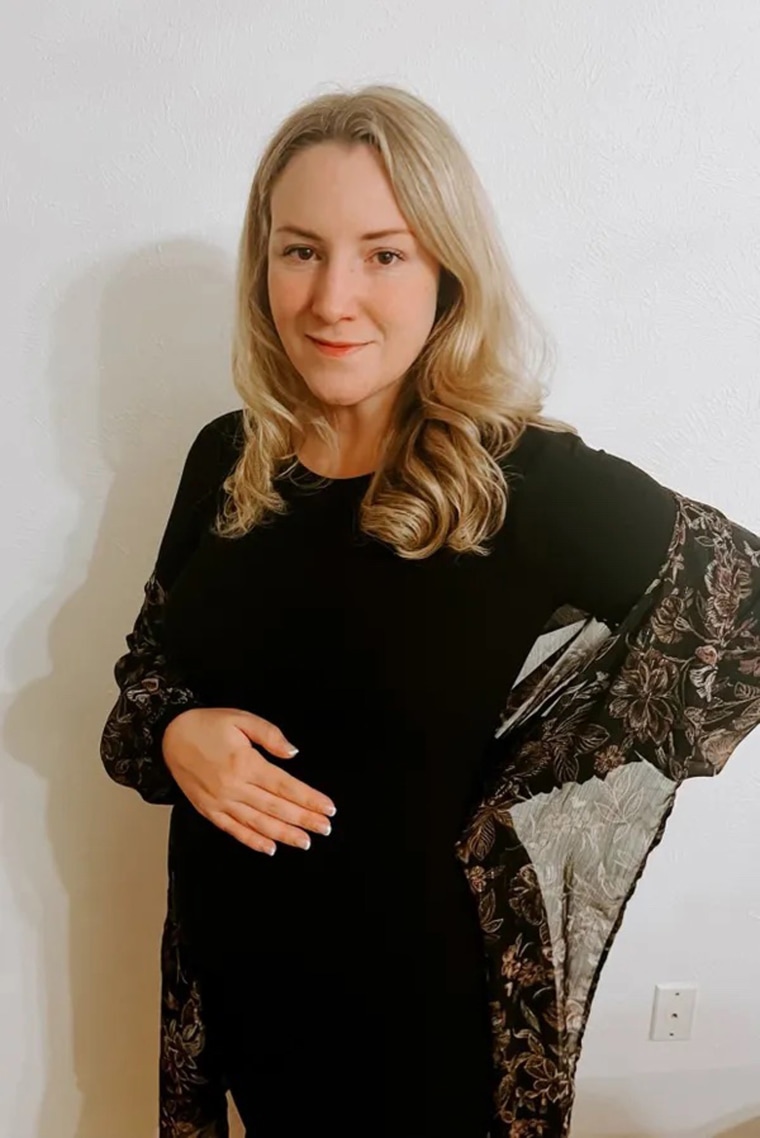
This article is more than
2 year old
A Texas woman whose fetus has a fatal diagnosis and who has been awaiting a decision from the Texas Supreme Court about whether she will be allowed to get an abortion said Monday that she has decided to leave Texas to get the procedure.
Kate Cox, a mother of two who is around 20 weeks pregnant, found out just after Thanksgiving that her developing fetus has trisomy 18, a fatal diagnosis. Seeking to terminate the pregnancy to protect Cox's health and future fertility, she and her husband sought a court order to block Texas’ abortion bans from applying in her case.
A district judge granted the request Thursday, but Texas Attorney General Ken Paxton sought an emergency stay from the state Supreme Court, which then paused the lower court’s order Friday evening.
"Due to the ongoing deterioration of Ms. Cox’s health condition ... Ms. Cox is now forced to seek medical care outside of Texas," Molly Duane, senior staff attorney at the Center for Reproductive Rights, which is representing Cox, said in a court filing Monday.
However, Duane also said in the filing that "because the issues in this case are capable of repetition yet evading review, the Plaintiffs nonetheless intend to proceed with their case."
In a statement Monday, Nancy Northup, president and CEO at the Center for Reproductive Rights, said: "This past week of legal limbo has been hellish for Kate. Her health is on the line. She’s been in and out of the emergency room and she couldn’t wait any longer."
"She desperately wanted to be able to get care where she lives and recover at home surrounded by family," Northup added. "While Kate had the ability to leave the state, most people do not, and a situation like this could be a death sentence."
Texas law prohibits almost all abortions with limited exceptions.
Trisomy 18 is a rare chromosomal disorder likely to cause stillbirth or the death of the baby shortly after it's born. It also poses health risks to a pregnant patient.
However, Paxton and lawyers for the state argued that Cox's attorneys had not sufficiently demonstrated that her situation qualified for an exception to the state's abortion laws, or that she would suffer “immediate and irreparable injury” without one.
As of Monday afternoon, the timeline for a decision from the Texas Supreme Court was unclear. It could still rule on the district court’s order at any time without requesting a further hearing or additional material from the two sides. Or it could decide to hold a hearing and bring the parties into court. There is not yet any indication on the court docket as to whether or when that might take place.
The nine-judge panel deciding on Cox’s case leans conservative.

During the lower court hearing Thursday, Duane argued that Cox was at high risk for multiple pregnancy complications, including hypertension, gestational diabetes and infection.
“Many of Miss Cox’s health risks during this pregnancy will put her life in danger if left untreated, and carrying this pregnancy to term will significantly increase the risks to her future fertility, meaning that she and her husband may not be able to have more children in the future,” Duane said.
A 2017 study found that trisomy 18 was associated with an increased risk of gestational diabetes, preterm delivery and cesarean section.
“Prolonging that pregnancy doesn’t change that outcome,” said Dr. Leilah Zahedi-Spung, a maternal-fetal medicine physician in Colorado and spokesperson for the Society for Maternal-Fetal Medicine. “It only increases the risks of things like gestational diabetes and preeclampsia, which we know have long-standing effects on the health of people who can have children down the line.”
According to her petition, Cox has elevated glucose levels, which put her at high risk for gestational diabetes. She also delivered both her children via cesarean section, and that makes her more likely to need the surgery — which brings more risks than vaginal birth — again.
Already, Cox has been to the emergency room four times "for pregnancy symptoms including severe cramps, leaking fluid and elevated vital signs," according to her lawyers.
State District Judge Maya Guerra Gamble acknowledged the risks Cox faces when she granted her requested order Thursday.
"The idea that Miss Cox wants desperately to be a parent and this law might actually cause her to lose that ability is shocking and would be a genuine miscarriage of justice," Gamble said.
Mutcherson said Cox's case could have major implications for the broader landscape of abortion rights and restrictions nationwide.
“Certainly there’s a lot personally riding on it for this family, but there’s also a lot for every pregnant person in Texas who has to make a decision about whether to have an abortion or not,” she said.